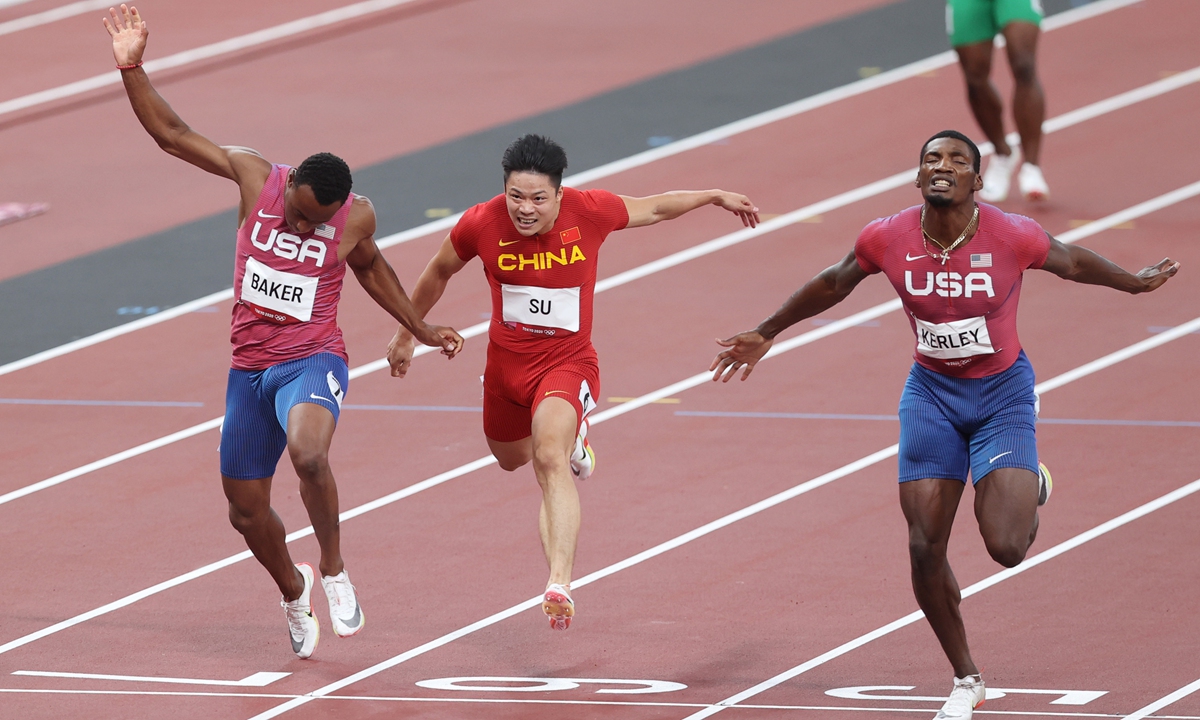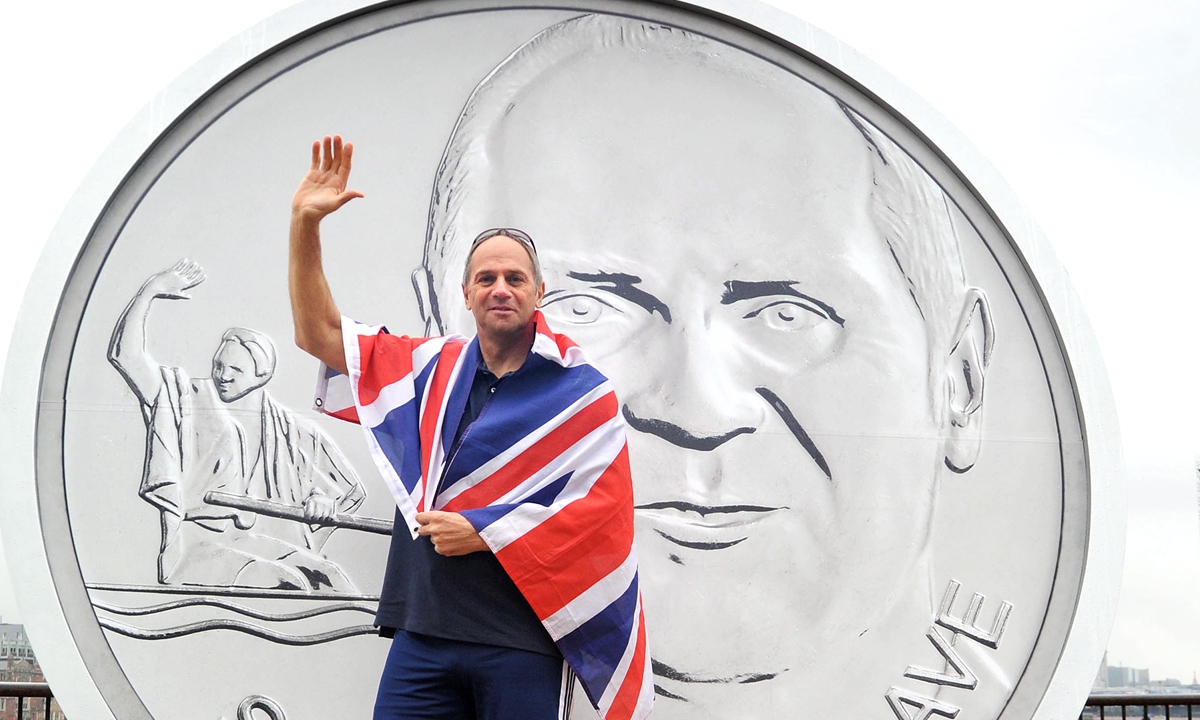
Chinese sprinter Su Bingtian (center) competes in the men's 100 meters final at the Tokyo Olympics on Sunday. Photo: Cui Meng/GT
Across Team China competing at the Tokyo Olympic Games, there are 30 foreign faces from 19 different countries at the side of Chinese athletes cheering on the stunning performances of these athletes.
They are one of key components of China's gold medal drive by identifying weaknesses in athletes and providing scientific training plans.
Chinese netizens are backing foreign coaches and also are touched by their instruction and delight when seeing Chinese collect gold medals, like sprinter Su Bingtian's and Wang Chunyu's American coach, Randy Huntington.
Randy Huntington, USAt the current edition of the Olympic Games, China has excelled across track and field. Sprinter Su Bingtian became the first Asian man in 89 years to run in an Olympic track finals and female runner Wang Chunyu also made her nation proud on Saturday by becoming the first Chinese woman to ever enter the final round of the women's 800 meters.
Both of them have been instructed by one coach-- Randy Huntington, an American.
Huntington has been Su's coach since 2014 and was responsible for the athlete's special training plan. Huntington played a key role in address Su's starting stance, poor breathing and pacing technique.
The training plan targeted these problems and made a big difference in boosting Su's times.
At Huntington's suggestions, Su changed the position of his feet on the runner and adjusted his starting foot. Such changes in detail allowed Su to maintain the top speed for the second half of the course, and also promoted his first transformation.
"He has helped us a lot in training, first of all on the concept of speed and the second on the change of pace," Su said of his coach.
Huntington's interview after Su's final on Sunday moved many Chinese netizens.
He said that Su had given everything in the semifinal, but the British runner's false start slightly affected Su in the final and this is "mostly my fault," Huntington said in the interview as he thought he should have done more work with Su.
Wang also thanked the coach on Sina Weibo after the match.
Marta Gómez Casas, Spain
Behind the success of China's butterfly swimmer Zhang Yufei was a Spanish support staff Marta Gómez Casas who calls Zhang a "Chinese little sister."
As a professional sport physiotherapist, Marta was invited by the national swimming team years ago to help Chinese swimmers avoid injuries as well as offering professional advice to swimmers on safe and effective training.
Zhang was one of those swimmers who sought out Marta's. She was born with scoliosis that leading to acute pains every time she trained. Marta made a special plan for treating her condition and offering systematic massage therapies by focusing on Zhang's hip bones, and waist joints.
Due to the prevention restrictions of COVID-19, Marta missed watching Zhang shine and claim a gold medal at the Tokyo Olympic Games, but she has always been close to her, and called the Chinese swimming team provided her with homey feelings.
On Marta's Instagram, she shared many posts about Zhang, and she felt so proud for Zhang after saw she won two gold medals in one day.
"I don't have really words to describe how I feel after see you swimming that way I'm sooooo proud of you and sooo HAPPY , thank you so much because you trusted on me, on my work and never avoid me," said Marta.
Marta's plan has not only helped Zhang physically feel better, but also has been very helpful on her to improve the performance in competition.
Besides being a fan of Chinese swimming teams, Marta is also a fan of Chinese volleyball teams.
"I didn't drink enough petit suisse in my childhood (emojis), I'm soo short," a line Marta posted on instagram in 2020 with a photo of her and Chinese volleyball player Wang Yuanyuan.
Hugues Obry, France Chinese Fencing Team's French coach Hugues Obry just achieved his aim to help his team regain their aura and reach the top of the sport at Tokyo Games, as Chinese fencer Sun Yinwen bagged a gold medal on second day after Olympics started.
On July 24, 29-year-old fencer Sun Yiwen edged Ana Maria Popescu of Romania at women's Épée Individual event, and claimed a third gold for the country. Sun's coach, French former fencer Hugues Obry rushed on to the court, lifted the newly crowned champion on his shoulder, and carried the Chinese national flag running in the venue to celebrate his trainee's win.
Olympic fans noticed Obry and were impressed by his rapport with Sun on the court and his love to China. They nicknamed Obry with "bald Hugues" to show their appreciation, which was also referred by Obry his own as a self introduction in a video shot after the competition.
"When it came to the final, I knew she had 80 percent chance to win, and I was very confident in her," Obry commented on Sun's performance after 24th match to the media, with a grin on his face.
"My goal [as their coach] is to rekindle the Chinese Fencing Team."
Obry took over Chinese Fencing Team as the head coach in September 2016, right after the team ended their campaign in Rio with silver and bronze medals, missing out on the gold.
"It was quite a shame that women's fencing team missed the gold… they have the potential with high standard…" Obry told Xinhua News in September 2016.
"They need to step out of shadow as soon as possible. So picking up their confidence should be my job priority," said Obry in 2016.
Obry set his ultimate goal as getting the Tokyo Olympic gold medal when he kicked off his coaching career in China in 2016, and helped women's fencing team claimed a silver at 2017 World Championships in Athletics, a bronze in 2018, and a goldat 2019's World Championships.
The 48-year-old Obry was a good fencer who bagged two silver medals at men'sépée individual and team respectively in Sydney 2000, won a gold medal at men's team épée in Athens Olympic Games in 2004.

Sir Steven Redgrave Photo: VCG
Steven Redgrave, UKThe Chinese rowing team shone at the Tokyo Olympic Games after winning a bronze and gold respectively in the men's double sculls and women's quadruple sculls in a "spectacular fashion," as described in Tokyo 2020's official website.
Behind the achievements made possible through the athletes' efforts stands Sir Steven Redgrave, the emblematic British rower who has coached the Chinese national rowing team since 2018.
Ever since Redgrave was appointed by The Chinese Rowing Association to be the "high performance director" for Chinese rowing, he started to set Olympic gold medal goals for the team, targeting both the Tokyo Games and the Paris Games in 2024.
"The Olympic Games in Tokyo are, of course, an important step in our strategy and China wants to win a gold Olympic medal there," Redgrave said in 2019 according to Reuters.
At the 2019 World Rowing Championships, Redgrave expressed he saw the potential of the Chinese team to compete for the Olympic gold. At the championships, Chinese teams won three golds and one bronze, which at the time Redgrave considered it was a sign that the team had paved the road to success at the Tokyo Games.
As the "high performance director," he is not only responsible for the training and strategic development of Chinese national rowing team, but also assists the Chinese Rowing Association in developing a system that includes research and youth training.
"I had been offered a job by the British rowing team before the Chinese Rowing Association came to me, but I got along with the visionary Chinese Rowing Association. Since Olympic love is forever, why not continue my rowing career in a new place?" said Redgrave in a media interview.
A five Olympic gold medal winner and one of the world's most respected and 'emblematic' British rowing athletes, Redgrave was more than ready to help China become one of the elite rowing nations in the world by recognizing opportunities and challenges such as Chinese athlete's power and tenacity, and also the room for them to develop more self-reliant mentally through competitive experiences.
"We can't mind other athletes, we can only control ourselves. I believe the Chinese team can go faster in the competition," Redgrave told media.





